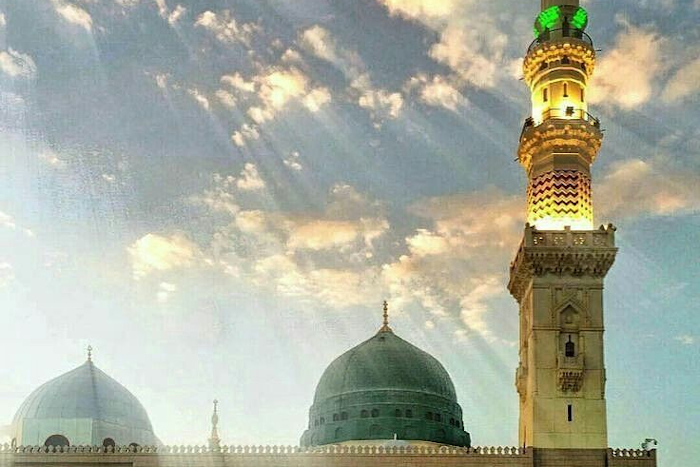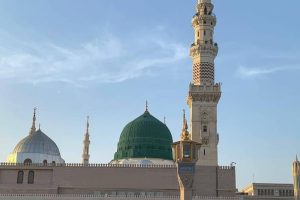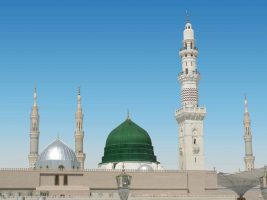
عن ابن عباس رضي الله عنهما عن النبي صلى الله عليه وسلم قال: من قال: جزى الله عنا محمدًا صلى الله عليه وسلم بما هو أهلُه: أتعبَ سبعين كاتبا ألف صباح (حلية الأولياء ٣/٢٠٦، وفي سنده هاني بن المتوكل وهو ضعيف كما في القول البديع صـ ١١٦)
Hazrat Ibnu Abbaas (radhiyallahu ‘anhuma) narrates that Hazrat Rasulullah (sallallahu ‘alaihi wasallam) said, “Whoever recites the following (Durood), he will (engage and) tire seventy angels (in recording the reward of the Durood recited) for a thousand days.”
جَزٰى اللهُ عَنَّا مُحَمَّدًا صَلّٰى اللهُ عَلَيْهِ وَسَلَّمَ بِمَا هُوَ أَهْلُهُ
May Allah Ta’ala reward Muhammad (sallallahu ‘alaihi wasallam) on our behalf as he is worthy (i.e. a reward that befits his esteemed position).
The Love of Rasulullah (sallallahu ‘alaihi wasallam) for his Ummah
It has been recorded in “Mawaahib Ladunniyah” from “Tafseer Qushairy” that on the day of Judgement, a believer shall appear for reckoning with a small measure of righteous deeds. Rasulullah (sallallahu ‘alaihi wasallam) shall appear, and place on the side of the righteous deeds, a small piece of paper that will be the size of the tip of one’s finger. The result will be that the scale of good deeds will far outweigh the evil deeds.
Seeing this, the believer will exclaim, “May my mother and father be sacrificed for your sake, who are you? How beautiful is your physical appearance, and how sublime is your conduct!” Rasulullah (sallallahu ‘alaihi wasallam) shall answer, “Verily I am your Nabi (sallallahu ‘alaihi wasallam). This which I have placed on your scale is the Salaat and Salaam that you used to recite upon me during your lifetime. Now I have come to your aid and assistance at your time of need.” (Sharhuz Zurqaani Alal Mawaahib 12/359)
Glad Tidings from the Side of Rasulullah (sallallahu ‘alaihi wasallam)
Hazrat Muhammad Utbi (rahimahullah) relates:
I entered Madinah Munawwarah, and presented myself before the mubaarak grave of Nabi (sallallahu ‘alaihi wasallam). Subsequently, I had seen a villager arrive. He seated his camel at the door of the Musjid and presented himself before the mubaarak grave of Rasulullah (sallallahu ‘alaihi wasallam). He offered his Salaam with utmost humility and love, and supplicated to Allah Ta‘ala in dua in a beautiful way.
He then said, “O Rasulullah (sallallahu ‘alaihi wasallam), may my parents be sacrificed for you! Indeed, Allah Ta‘ala had divinely selected you as his final messenger and revealed wahi (revelation of the Qur’aan Majeed) to you. He revealed to you such a unique book (the Qur’an Majeed), that encompasses the knowledge of the former and the latter Ambiyaa and Rasuls (‘alaihimus salaam). Allah Ta‘ala has stated in the Qur’an Majeed, and His word is the truth:
وَلَوْ اَنَّهُمْ اِذْ ظَّلَمُوْٓا اَنْفُسَهُمْ جَآءُوْكَ فَاسْتَغْفَرُوا اللّٰـهَ وَاسْتَغْفَرَ لَهُمُ الرَّسُوْلُ لَوَجَدُوا اللّٰـهَ تَوَّابًا رَّحِيْمًا (سورة النساء: 64)
And if, they (the servants of Allah Ta‘ala) after wronging themselves (through committing sins), had come to you, [O Muhammad (sallallahu ‘alaihi wasallam)], and begged Allah Ta‘ala’s forgiveness, and the Messenger had sought forgiveness on their behalf, they would have surely found Allah Ta‘ala Most Forgiving, Most Merciful.
The villager then said, “O Nabi of Allah (sallallahu ‘alaihi wasallam), I have come to your grave in compliance with the verse of Allah Ta‘ala. I admit that I have wronged myself by committing excessive sins and I beg you to intercede on my behalf before Allah Ta‘ala.” He then turned to the mubaarak grave and poured out his heart reciting the following couplets:
يَا خَيْرَ مَنْ دُفِنَتْ بِالْقَاعِ أَعْظُمُهُ ** فَطَابَ مِنْ طِيْبِهِنَّ الْقَاعُ وَالْأَكَمُ
O the greatest from all those who are buried beneath the earth! From the splendid fragrance emitting from your mubaarak limbs, the mountains and plains become fragranced.
أَنْتَ النَّبِيُّ الَّذِيْ تُرْجٰى شَفَاعَتُهُ ** عِنْدَ الصِّرَاطِ إِذَا مَا زَلَّتِ الْقَدَمُ
You are that Nabi whose intercession is hoped for at the crucial moment when the feet will slip on the bridge over Jahannum (i.e. the pul siraat)
نَفْسِيْ الْفِدَاءُ لِقَبْرٍ أَنْتَ سَاكِنُهُ ** فِيْهِ الْعَفَافُ وَفِيْهِ الْجُوْدُ وَالْكَرَمُ
May my life be sacrificed for that grave wherein you are residing, in it is buried the embodiment of purity, nobility and generosity.
وَ صَاحِبَاكَ لَا أَنْسَاهُمَا أَبَدًا ** مِنِّيْ السَّلَامُ عَلَيكُمْ مَا جَرٰى الْقَلَمُ
I will never forget your two illustrious companions (Hazrat Abu Bakr and Hazrat Umar [radhiyallahu ‘anhuma]) as long as the pen (of taqdeer) continues writing. May salutations and salaams be conveyed to you all from my side.
After reciting these beautiful words in praise and honour of Rasulullah (sallallahu ‘alaihi wasallam), the villager mounted his conveyance and began to leave. Muhammad Utbi (the narrator of the incident) says, “I was overcome by sleep, and in a vision, I was blessed with the vision of Rasulullah (sallallahu ‘alaihi wasallam). Rasulullah (sallallahu ‘alaihi wasallam) addressed me saying, ‘O Utbi! Hasten towards the villager and give him the glad tidings from my side that Allah Ta‘ala has forgiven his sins.’” (Al Qowl-ul-Badee pg. 342)
يَا رَبِّ صَلِّ وَ سَلِّم دَائِمًا أَبَدًا عَلَى حَبِيبِكَ خَيرِ الْخَلْقِ كُلِّهِمِ
 Ihyaaud Deen An Effort to Revive Deen in Totality
Ihyaaud Deen An Effort to Revive Deen in Totality

